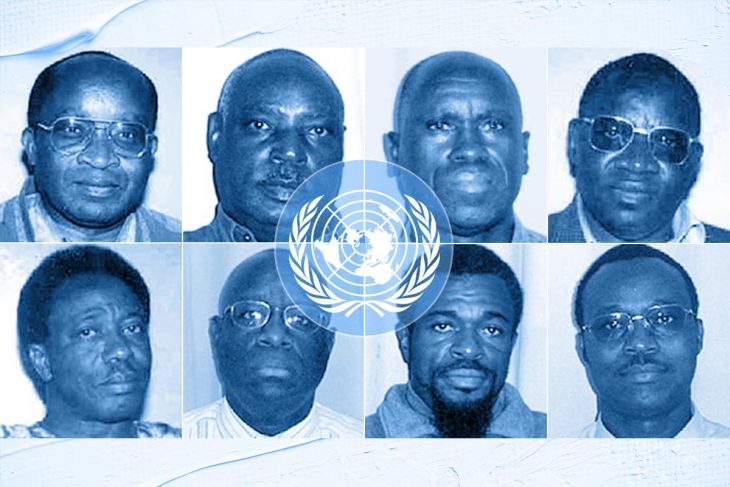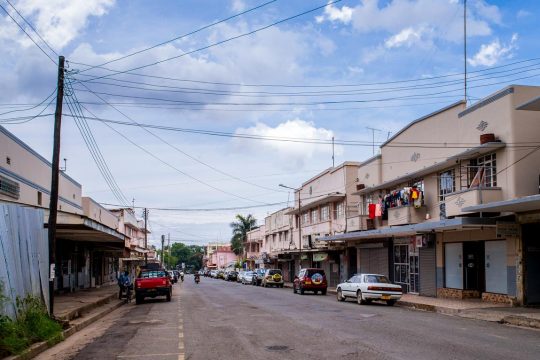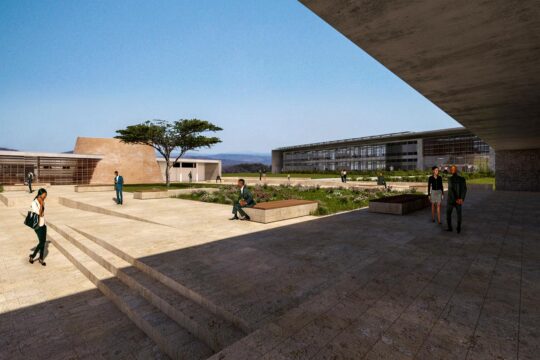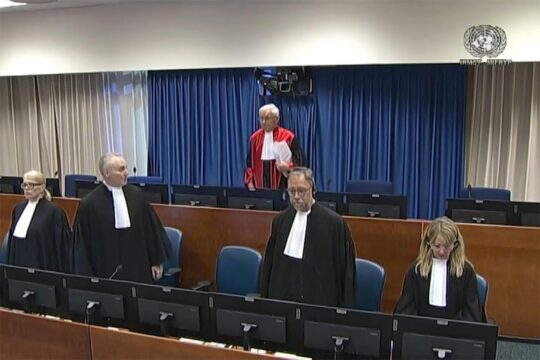The so-called "resettlement agreement" [lien / document] signed in secret on November 15 with the government of Niger finally relieved the United Nations of its shameful burden of acquitted or released persons for whom the International Criminal Tribunal for Rwanda (ICTR) had still not found a host country when it closed in December 2015.
There are nine of these ICTR "confined” people [see box below]. In vain these men have been waiting between ten and 17 long years for a country to agree to take them and grant them identity documents. Although supposed to be free at the end of their trial or period of detention, they were sharing a "secure" residence in Arusha (Tanzania), a few steps from the headquarters of the UN tribunal that tried them, without much hope of ever escaping that unworthy and disrespectful impasse.
And then, at the beginning of December, they were told that they were leaving... for Niger! No Rwandan born in the land of a thousand green hills dreams of spending the rest of his life in the Sahel. But either way, eight of them accepted this "offer", packed their bags, and left their residence in Arusha [our photos], which was suddenly empty.
And so, on the evening of December 5, at the Kilimanjaro International Airport in Arusha, two weeks after the agreement was signed, four acquitted Rwandans - Prosper Mugiraneza, Protaïs Zigiranyirazo, François-Xavier Nzuwonemeye and André Ntagerura - and four released after serving their sentences - Anatole Nsengiyumva, Tharcisse Muvunyi, Alphonse Nteziryayo and Innocent Sagahutu - boarded an Ethiopian airlines flight to Niger, which was to be their country of permanent residence, according to the terms of the agreement.
"As if they were getting rid of us”
"It’s if they were getting rid of us. They took us by surprise; they came with documents to sign, and told us to prepare our luggage to leave for Niger in three days," said Innocent Sagahutu, contacted by telephone shortly after his arrival in Niamey. Without being consulted, he says, they signed a "commitment" document, in which each expressed his or her "desire and decision to be resettled in the Republic of Niger (...) of their own free will and voluntarily, without any coercion, incitement or threat from the Mechanism or any other person or entity".The three days at their disposal, he recalls, were very stressful.
The President of the UN Mechanism, which manages the residual functions of the ICTR, cautiously waited until December 13 to announce the good news in a speech to the UN Security Council: "I wish to share with Council Members that, on 15 November 2021, a milestone agreement between the Government of the Republic of Niger and the United Nations, on the relocation of persons acquitted or released by the ICTR or the Mechanism, was signed,” said Judge Carmel Agius.
“I can confirm that the agreement has already been implemented with respect to eight of them,” Judge Agius continued. Rwanda blasted the agreement. But no matter, its hasty execution saw eight of the nine residents of the notorious "safe house" in Arusha, Tanzania, transferred to Niger’s capital, Niamey.
Indeed, there was much to celebrate, even for those transferred. The Mechanism, in the commitment document signed by the transferees, promises to pay for housing for the first year and "a one-time lump sum” of US$ 10,000 to cover settlement costs upon arrival in Niger.
As soon as they arrived in Niamey, the former undocumented migrants from Arusha received residence permits renewable each year and began to make a life for themselves, they told Justice Info, despite the difficulties of cultural adaptation, the cost of living, and the Sahel’s climatic conditions that are different from those of central and east Africa. "Compared to what we experienced in Tanzania, this was progress. With this residence permit, we were able to get SIM cards, we were able to open bank accounts," says Sagahutu.
Bicamumpaka, the recalcitrant
Only one resident of the Arusha "safe house" did not want to sign up. Jérôme Bicamumpaka, acquitted more than ten years ago, had been undergoing treatment for five months in a hospital in Nairobi, the Kenyan capital. He justified his refusal by the absence of specialized hospitals for his treatment in Niger.
Furious, the Mechanism's Registrar reportedly ordered him to leave the "safe house" in Arusha by December 22 - a measure that the Mechanism's president suspended, pending consideration of Bicamumpaka's urgent and confidential request against his transfer to Niger.
But then, to everyone's surprise, between Christmas and New Year's Eve, the tide turned dramatically in Niger. On December 27, Niamey notified its eight new residents by decree that they were "definitively expelled from the territory of Niger with a permanent ban on their stay for diplomatic reasons”. The document signed by Interior Minister Hamadou Amadou Souley gave them seven days to leave Niger.
Abubacarr Tambadou, the Mechanism’s Registrar, had been praised by Judge Agius two weeks earlier before the Security Council for having found a solution to “a situation that has seemed, at times, almost impossible to resolve and is referenced in no less than 10 Council decisions, as well as numerous reports”. For him, too, the tide has turned dramatically: Tambadou is now instructed by the same judge "to maintain dialogue with the competent Niger authorities (...) and to take all necessary measures to ensure that the expulsion order does not in any way infringe upon the fundamental rights of the resettled persons”.
A wind of panic blew over the former residents of Arusha. They were once again without papers. Three days before the decree was issued, the Niger authorities withdrew their residence permits under the pretext that they were going to make corrections to the documents. This was in complete violation of the agreement with the United Nations, which stipulates that "the Republic of Niger shall grant to persons released or acquitted, without requiring payment, the status of permanent resident, and shall issue them with the relevant identity documents, within three months of their entry into the territory”.
Christmas is over. The glimmer of hope for the undocumented migrants has just faded. "Everything is going from bad to worse," said one of them, who wished to remain anonymous, on the phone to Justice Info. "We don't know if it was the Mechanism that sold us out, or if it was Rwanda that put pressure on the Nigerien government. We are puzzled." "The way we were rushed from Arusha did not bode well," said another.
Niger ordered to suspend expulsion
Niger's decision came at a time when the Mechanism's officials were on vacation. But the Rwandans counterattacked. They sought local lawyers, who applied to the relevant authorities and judicial institutions for a stay of the expulsion order. Three of the acquitted, through their international lawyers including the tough American Peter Robinson, filed an application with the Mechanism on December 29, asking it to order Niger to allow their continued presence on its territory "until such time as the [Mechanism] Registrar has made arrangements for relocation to another safe State, or the Expulsion Order is reversed”.
The storm subsided temporarily. On the day the seven-day ultimatum expired, the Registrar's assistant, Horejah Bala Gaye, announced by email to the Rwandan lawyers: "the Republic of Niger has agreed to suspend the expulsion order against your clients for 30 days pending a solution”.
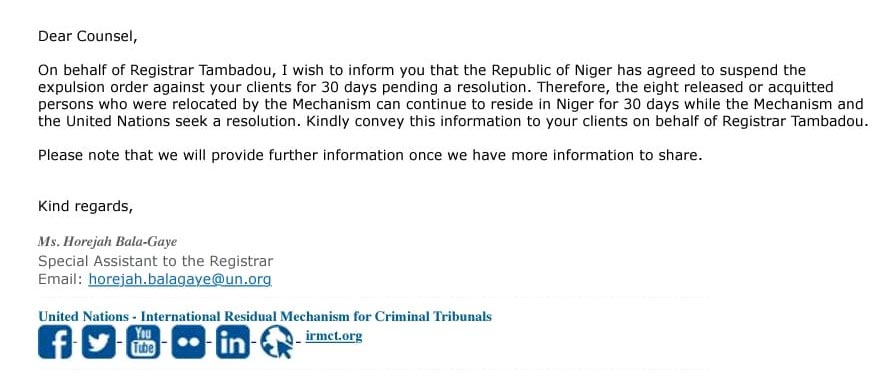
Mechanism judge Joseph E. Chiondo Masanche of Tanzania had on December 31 ordered the Niger authorities to provide "within 30 days" written observations "on the validity of the expulsion order", ordering Niger “to suspend the execution of the expulsion order and allow the resettled persons to remain on its territory, in accordance with the agreement (…) until the present issue has been finally resolved".
The shadow of Rwanda
With what effect, no one knows. There is no evidence that Niger, by suspending the execution of the expulsion order for 30 days, has complied with the injunctions of the Mechanism judge. There has been no official document from Niger since the expulsion order, except for the bulk rejections of petitions addressed to Niger’s administrative and judicial authorities on behalf of the eight Rwandans by lawyer Hamadou Kadidiatou in the case of "Protaïs Zigiranyirazo and seven others against the State of Niger”. The Nigerien lawyer asked for the suspension of the expulsion, saying it is "in flagrant violation of the legal commitments to which [Niger] has freely subscribed", and that her clients, now without papers, risked "being deported to Rwanda". The lawyer added in her petition that there was "no doubt that the Rwandan government is behind the deportation" of her clients, but she did not provide any proof.
She is not alone in pointing the finger at Rwanda. In support of this theory, which is gaining ground among Rwandan opponents in exile, including the Rwandan National Congress in a December 30 communiqué, some are citing as proof the discontent expressed by the Permanent Representative of Rwanda to the United Nations, Valentine Rugwabiza, on December 13, in reaction to announcement of the resettlement of her compatriots in Niger.
Complaining that her country had not been informed, she said her government was waiting for explanations from the Mechanism, including on the money promised whilst "their cases have been closed”. "We hope that Niger will respect its obligations to ensure that no one uses its soil to undermine the peace and security of the Great Lakes region as has happened in the past," Rugwabiza was quoted as saying by the Rwandan government newspaper Imvaho nshya.
The Afro America Network, based in Baltimore, USA, goes further. In an article published on its website on December 28, the online paper claims that “the decision was made after a lengthy call received by President Mohamed Bazoum from French President Emmanuel Macron, on December 20, 2021”.
The Afro America Network said the call was about a request by Niger’s President Bazoum - who reportedly faced a coup attempt two days before being sworn in - to help strengthen his guard and protect important sites in his country. Rwanda, which according to this website is already protecting French interests in Mozambique, was approached by Macron and volunteered to do so, but made it a condition for sending a contingent that the eight Rwandans be expelled "without delay" from Niger.
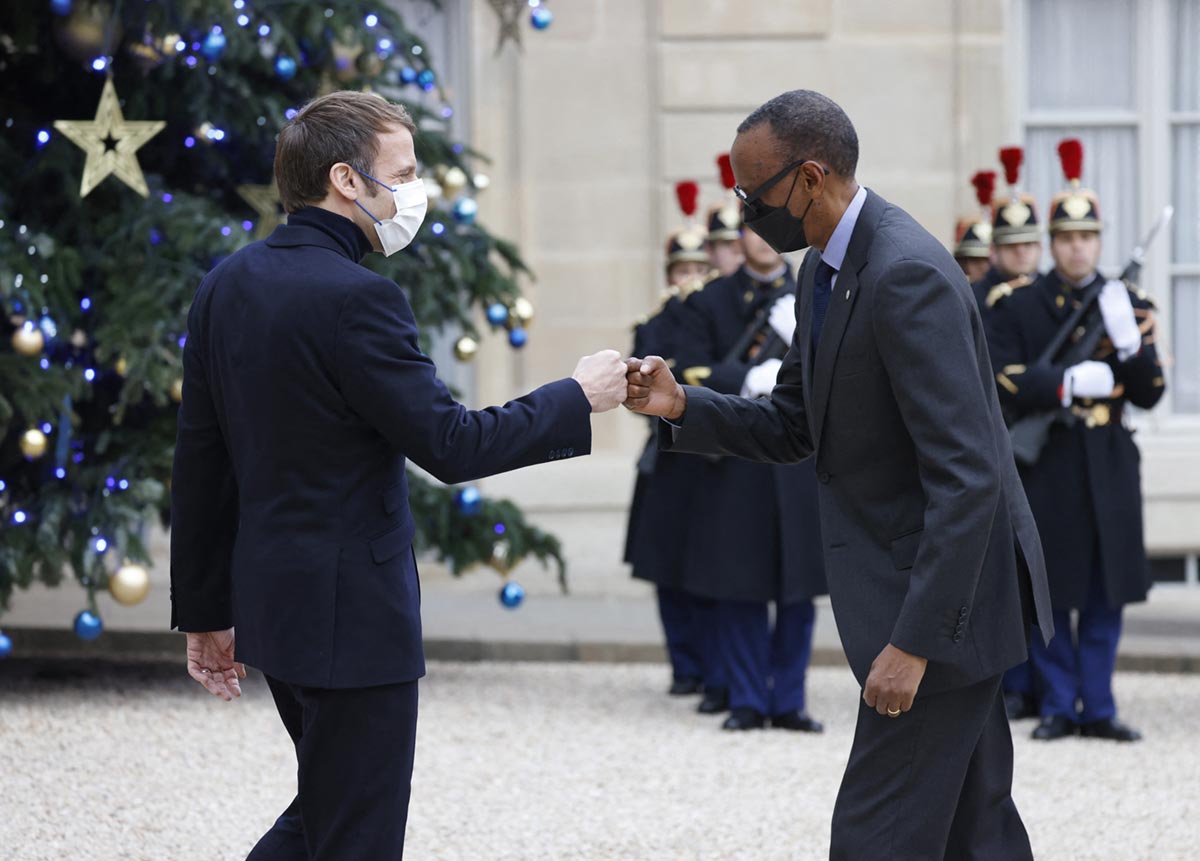
Impasse in Niamey
What will happen after the 30-day suspension of the expulsion? Can the eight return to Tanzania in the worst case scenario? Nothing is less certain. Already, the lawyers of these unfortunate people are insisting that the Mechanism urgently evacuate their clients to a "safer" country. But haven't they been refused for almost two decades?
Belgian lawyer Jean Flamme, who is defending the interests of Innocent Sagahutu, believes that "Niger’s government is indeed not trustworthy because it has fundamentally violated an international agreement with the UN, only a few weeks after it came into force”. For him, the risk now is the "imminent abduction" of these people, currently deprived of all freedom, undocumented, and "surrounded by armed police".
When asked, the Mechanism said it could "not comment on the situation at the moment".
THE NINE "STATELESS” OF THE ICTR
The following Rwandan personalities were tried by the International Criminal Tribunal for Rwanda (ICTR), sitting in Arusha (Tanzania), and released either after their acquittal or after having served their sentence. All are awaiting a host country, and are presented here in the order of how long they have been in the Arusha "safe house", where they resided together:
- André Ntagerura (72), former Rwandan Minister of Transport, acquitted by the lower court and then on appeal on July 7, 2006.
- Protaïs Zigiranyirazo (84), brother-in-law of former Rwandan president Juvénal Habyarimana, acquitted on appeal on November 26, 2009.
- Jérôme Bicamumpaka (65), former Minister of Foreign Affairs, acquitted on September 30, 2011.
- Anatole Nsengiyumva (72), former head of Military Intelligence, sentenced on appeal to 15 years in prison on December 14, 2011, and released after serving his time.
- Tharcisse Muvunyi (69), former commander of the NCO School in Butare (southern Rwanda), sentenced to 15 years in prison on appeal on April 1, 2011, released on March 6, 2011 after serving two-thirds of his sentence.
- Prosper Mugiraneza (65), former Minister of Public Service, acquitted on appeal on February 4, 2014.
- François-Xavier Nzuwonemeye (67), former commander of the army's reconnaissance battalion, acquitted on appeal on February 11, 2014.
- Innocent Sagahutu (60), former deputy commander of the reconnaissance battalion, sentenced to 15 years on appeal on February 11, 2014, released three months later after serving two-thirds of his sentence.
- Alphonse Ntizeryayo (75), former prefect of Butare (southern Rwanda), sentenced on appeal to 25 years in prison on December 14, 2015, released after serving three-quarters of his sentence.


